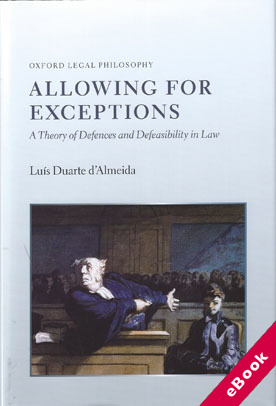
The device(s) you use to access the eBook content must be authorized with an Adobe ID before you download the product otherwise it will fail to register correctly.
For further information see https://www.wildy.com/ebook-formats
Once the order is confirmed an automated e-mail will be sent to you to allow you to download the eBook.
All eBooks are supplied firm sale and cannot be returned. If you believe there is a fault with your eBook then contact us on ebooks@wildy.com and we will help in resolving the issue. This does not affect your statutory rights.
You find yourself in a court of law, accused of having hit someone. What can you say to avoid conviction? One thing you can do is simply to deny the accusation: 'No', you claim, 'I didn't do it'. But suppose you did do it. You may then give a different answer. 'Yes, I hit him', you grant, 'but it was self-defence'; or 'Yes, but I was acting under duress. '
To answer in this way - to offer a 'Yes, but...' reply - is to hold that your particular wrong was committed in exceptional circumstances. Perhaps it is true that, as a rule, wrongdoers ought to be convicted. But in your case the court should set the rule aside. You should be acquitted. Within limits, the law allows for exceptions. Or so we normally think. In fact, the line between rules and exceptions is harder to draw than it seems. How are we to determine what counts as an exception and what counts as part of the relevant rule?
The distinction has important practical implications. But legal theorists have found the notion of an exception surprisingly difficult to explain. This is the long-standing jurisprudential puzzle, the puzzle of 'defeasibility', that this book looks to solve.
The book is divided into three parts. Part I, Defeasibility in Question, critically introduces the topic and articulates in precise terms the core problem of defeasibility in law. Part II, Defeasibility in Theory, develops a comprehensive proof-based account of legal exceptions. Part III, Defeasibility in Action, looks more closely into the workings of exceptions in accusatory contexts, including the criminal trial.